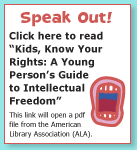
- Complaints must be made in writing.
- Complainants should identify themselves both by name/address, and by their interest in the material (i.e., as a parent, student, religious leader, etc.).
- Complainants must have read/seen the entire work objected to.
- The complaint must be specific about the reasons for the objection.
- Complaints should request a specific remedy (i.e., an alternative assignment for an individual, or removal/exclusion affecting the entire school community).
- Complaints, standing alone, do not provide grounds for disciplining teachers or librarians.
It is advisable for policies to contain a statement supporting intellectual and academic freedom, and an explanation of the importance of exposing students to a wide variety of material and information, some of which may be considered “controversial.” Policies should also clearly indicate that certain kinds of objections do not provide a legally permissible ground for removal, exclusion or restriction. Disagreement with a specific idea or message, and personal objections to materials on religious, political or social grounds, are the most common grounds for challenges and the most suspect. Such concerns may justify a parent’s request that his or her child be assigned alternate material, and if shared more widely they may suggest the need for discussion about how teachers and school officials can better explain the educational value of the material, and ways in which any perceived harms can be alleviated, perhaps through inclusion of additional materials or otherwise. But such personal viewpoint-based concerns, standing alone, rarely justify removal of a book or other material and may raise First Amendment issues.
A committee - often composed of instructional staff, library staff, and administrators, and sometimes including students and parents - ordinarily processes complaints. Their recommendation is usually subject to a review process, but the judgment of such a committee made up by professionals, with or without lay members, is entitled to deference if grounded in sound educational and pedagogical principles. Its decision should only be reversed for compelling educational reasons. Materials should never be removed unless the complaint procedures are followed, and materials should never be removed prior to completion of the complaint process.